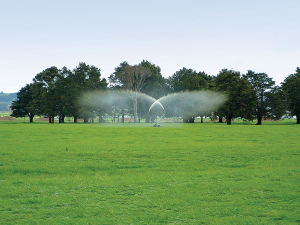Otago Regional Council to launch winter flyovers
Otago Regional Council is set to begin its annual winter farm flyovers in the next three weeks.
 Any effluent applied to saturated soils is likely to pond and run off or leach through the soil or into tile drains, rather than being absorbed by the plants.
Any effluent applied to saturated soils is likely to pond and run off or leach through the soil or into tile drains, rather than being absorbed by the plants.
Applying effluent to saturated soils is prohibited, and if a farmer is found to be in breach of this rule, they could face enforcement action.
When the soil is saturated, the pores within it (gaps between soil particles) are filled with water.
Any effluent applied during these conditions is likely to pond and run off or leach through the soil or into tile drains, rather than being absorbed and taken up by the plants.
So, how do you know if the soil is saturated? A simple squelch test can tell you, according to Otago Regional Council.
Ponding occurs when the effluent, solids, and liquids that are applied to land stay on the surface as a pond or puddle rather than being rapidly absorbed into the soil.
Ponding of effluent results in runoff and leaching into waterways and groundwater aquifers and is a prohibited activity in the Otago Water Plan.
What causes ponding?
Once the soil is squelchy under foot or at saturation point, it’s too late to avoid ponding and runoff. Irrigate only when there is enough soil water deficit to absorb the applied effluent.
If ponding or runoff occurs when there is a soil water deficit, it means you are applying too much effluent or applying it too quickly.
Applying solids, sludge, muck and slurry to paddocks must be treated the same as liquid effluent.
The same goes for effluent being applied with irrigation water, no matter what the mix is.
Good practices include timing: Do not apply sludge, muck and slurry solids to soils that are at or near saturation. Apply it to land when the grass or crops are able to take it up quickly and use it when soil moisture levels are low, and soil temperatures are warmer. Keep the application well away (at least 50 metres) from waterways.
Apply it as thinly and as evenly as possible. Do not dump large piles of muck onto paddocks. This creates a concentrated patch of effluent, or ponding, which is prohibited.
One of New Zealand’s longest-running pasture growth monitoring projects will continue, even as its long-time champion steps away after more than five decades of involvement.
The Insurance & Financial Services Ombudsmen Scheme (IFSO Scheme) is advising consumers to prepare for delays as insurers respond to a high volume of claims following this week's severe weather.
Additional reductions to costs for forest owners in the Emissions Trading Scheme Registry (ETS) have been announced by the Government.
Animal welfare is of paramount importance to New Zealand's dairy industry, with consumers increasingly interested in how food is produced, not just the quality of the final product.
Agriculture and Forestry Minister Todd McClay is encouraging farmers and growers to stay up to date with weather warnings and seek support should they need it.
The closure of SH2 Waioweka Gorge could result in significant delays and additional costs for freight customers around the Upper North Island, says Transporting New Zealand.